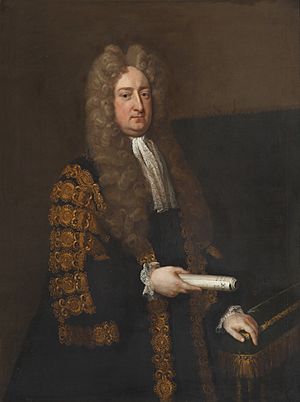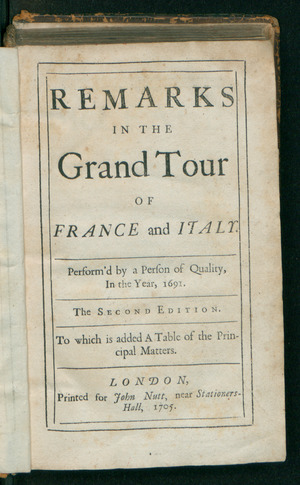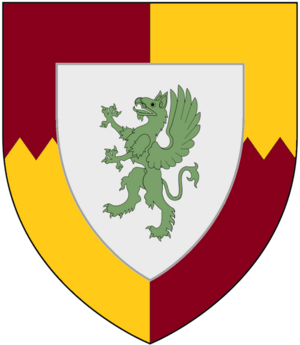William Bromley (Speaker) facts for kids
Quick facts for kids
William Bromley
|
|
|---|---|

Portrait by Michael Dahl
|
|
| Speaker of the House of Commons of Great Britain |
|
| In office 1710–1713 |
|
| Preceded by | Richard Onslow |
| Succeeded by | Sir Thomas Hanmer |
| Secretary of State for the Northern Department | |
| In office 17 August 1713 – September 1714 |
|
| Preceded by | The Viscount Bolingbroke |
| Succeeded by | The Viscount Townshend |
| Personal details | |
| Born | 1663 Warwickshire |
| Died | 13 February 1732 |
| Parents |
|
William Bromley (born 1663 – died 13 February 1732) was an important English politician from Baginton, Warwickshire. He was a member of the English and later the British Parliament from 1690 until his death in 1732.
Bromley held two very important jobs. He was the Speaker of the House of Commons of Great Britain from 1710 to 1713. This role is like the referee or leader of the main part of Parliament. After that, he became the Secretary of State for the Northern Department from 1713 to 1714. This was a top government job, dealing with foreign affairs.
He was a member of the Tory political party. He supported the Hanoverian Succession in 1714, which meant he believed the Hanover family should become the new royal family of Britain.
Contents
Early Life and Education
William Bromley was born in 1663 at his family's home in Baginton, Warwickshire. His father was Sir William Bromley, and his mother was Ursula Leigh.
He went to Christ Church, Oxford university in 1679 and earned his first degree in 1681. He later received a higher degree in law in 1702. In 1683, he began studying law at the Middle Temple, which is one of the places where people train to become lawyers in London.
Starting a Political Career
William Bromley was traveling in France and Italy in 1688 when a big event called the Glorious Revolution happened in England. This revolution changed who was king and queen. When he returned to England, he started his career in politics.
Throughout his time in public life, Bromley was known as a strong Tory. He was also known for being honest, but sometimes very firm in his political views. His political opponents sometimes tried to say he supported the old royal family (the Jacobites). They would even use his travel book, Remarks on the Grand Tour of France and Italy, to try and prove this.
First Time in Parliament
At the 1690 English general election, Bromley was elected as a Member of Parliament (MP) for Warwickshire. He was a good speaker and quickly became well-known, especially among other Tories.
In 1696, Bromley refused to take an oath that said King William III was the rightful king. Because of this, he was not allowed to serve in Parliament and was not re-elected in 1698.
Representing Oxford University
Bromley returned to Parliament in March 1701. This time, he was elected for the Oxford University area, which was a strong Tory area. He remained an MP for Oxford University for the rest of his life.
He strongly disagreed with "occasional conformity." This was when some religious dissenters (people who weren't part of the official Church of England) would attend Church of England services just enough to avoid legal punishments. Bromley tried to pass laws to stop this, but his ideas were not accepted.
Becoming Speaker of the House
From 1702 to 1705, Bromley was the leader of an important committee in the House of Commons. In 1705, he tried to become the Speaker of the House. At this time, his political enemies republished his travel book. They even added a special table to guide readers to parts they claimed showed he supported Catholics or the Jacobites. Bromley did not become Speaker in 1705.
However, after the 1710 election, the Tory party had a large majority in the House of Commons. On 25 November 1710, William Bromley was elected Speaker without anyone opposing him. In 1711, he also became a member of the Privy Council, a group of important advisors to the King.
In 1713, while he was Speaker, Bromley made a famous comment to a Scottish MP. He said that England had "caught hold of Scotland" and would "keep her fast." This comment made many people in Scotland believe that the union between England and Scotland was just a way for England to control Scotland.
Later Political Roles
In 1713, Bromley left his role as Speaker to become the Secretary of State for the Northern Department. This was a very high position in the government. However, he lost this job in 1714 when the new King, George I, chose a Whig government.
Bromley never held a government job again, but he remained a leading Tory in the House of Commons until his health declined in the 1720s. He continued to serve as an MP until he died in 1732. He also strongly supported Robert Harley during his impeachment trial from 1715 to 1717.
Family Life
William Bromley was married four times. He had children from his first and fourth marriages.
His children included:
- Clobery Bromley (1685–1711)
- Thomas Bromley (died 1716)
- William Bromley (died 1737)
- Elizabeth Bromley (died 1742)
- Anne Bromley
Arms
 | Valerie Thomas |
 | Frederick McKinley Jones |
 | George Edward Alcorn Jr. |
 | Thomas Mensah |



